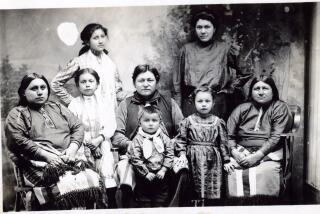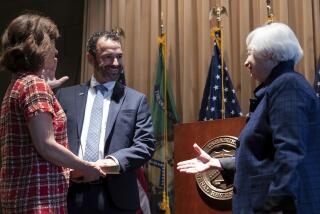Reforms Improving BIA, Head of Troubled Agency Says
- Share via
WASHINGTON — When he took over as head of the Bureau of Indian Affairs in 1997, Kevin Gover’s top goal was simply to make the agency competent at providing services to nearly 560 tribes.
He commissioned a report by outside experts that found a “lack of credible management” so serious that the BIA often inadvertently broke the law. After nearly three years of working on reforms, Gover says the agency has improved but has not yet achieved basic competence in all areas.
“We’ve got a ways to go. Another three years like this, and we’ll be in really good shape,” Gover said in an interview last week.
Still, Gover is optimistic: An increase of about $262 million for the agency’s $2-billion budget this year will help, as will a series of administrative changes meant to streamline and energize the BIA, he said.
“The reality is, we’re not going to finish any of these reform efforts on my watch,” Gover said. “The next guy could get the credit for having fixed these things. And that’s fine with me.”
Gover leaves office next month, making way for an eventual successor to be appointed by President-elect George W. Bush. A lawyer and member of Oklahoma’s Pawnee tribe, Gover will work in the Washington office of the Phoenix-based law firm Steptoe & Johnson.
As head of the BIA, Gover has focused on getting more funding and improving oversight for reservation education, law enforcement and land management. He also tried to raise the agency’s image with Congress and fought efforts to cut into tribes’ autonomy from state and local governments.
“I said early on, there’s a great deal of goodwill in the Congress toward Indians. There’s not much goodwill toward the bureau,” Gover said. “What we had to do was say, ‘If you want to help Indians, you’ve got to help the bureau, because we are the vehicle.’ And I think that message sunk in, and I think that’s why we got a $300-million increase in funding this year.”
Gover’s most prominent symbolic act came in September, when he offered a formal apology to fellow Indians for the BIA’s 176-year legacy of attempts to eradicate Native Americans and their cultures. Although some tribal leaders dismissed it as a hollow gesture, given the agency’s many problems, other Indian leaders praised Gover for saying what they believe should have been said long ago. Gover said the apology was important for two reasons: to help the BIA’s majority-Indian work force deal with the paradox of working for an agency that has done harm to their people and to help Native Americans get beyond “a culture of victimhood.”
One of Gover’s biggest headaches has been a lawsuit by hundreds of thousands of Native American trust account holders. The accounts, which hold proceeds from oil wells and other uses of tribal land, have been so mismanaged that the U.S. cannot say precisely how many there are, who has them and how much money they should hold.
The federal judge in the case held Gover, Interior Secretary Bruce Babbitt and then-Treasury Secretary Robert E. Rubin in contempt of court last year for problems in handing over documents. Lawyers for the account holders and some of the plaintiffs have bitterly criticized Gover’s handling of reforms to the account system.
But Gover repeatedly insists that the lawsuit is necessary to keep the pressure on the government to solve the problem. Gover, whose own account has only 8 cents in it, said he hopes the incoming Bush administration can settle the case.
“I think that the government has got to be willing to pay more than it thinks can be proved, just to be sure that no Indian person receives less compensation than they should,” Gover said.
Gover, who helped raise money and gather native support for President Clinton before joining the administration, said he plans to resume an active role in the Democratic Party, advising candidates on Native American issues. At Steptoe & Johnson, Gover expects to represent tribes and companies that want to do business with tribes.
Gover’s top priority will be helping tribes with telecommunications and other high-tech ventures. “We were left behind in the agricultural revolution, left behind in the industrial revolution, and we’re about to be left behind in the information revolution,” Gover said. “And if we don’t have tribes establish a foothold in that business, they’re just going to be left behind again.”
More to Read
Sign up for Essential California
The most important California stories and recommendations in your inbox every morning.
You may occasionally receive promotional content from the Los Angeles Times.













